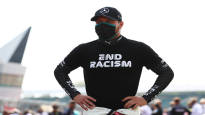The Formula 1 season starts this weekend in Bahrain. There are no major rule changes planned for the games compared to last season.
On the other hand, the International Automobile Association is interfering with the drivers’ freedom of expression with a tighter grip. In the future, political or religious statements may only be made with permission from the FIA.
For example, by actively taking a stand on things with Lewis Hamilton there is no point on the podium wearing a shirt with a social message.
However, in interviews and press conferences, you can talk about things that are important to you, if you are asked about them. During F1 events, political expressions are not allowed, but outside of them and on social media, yes.
Valtteri Bottas and Lewis Hamilton have strongly questioned the rule reform.
– I think we should have the right to talk about what we want, Bottas stated to Expressen. (you switch to another service)
– This sport has a responsibility to speak and raise awareness about important topics, especially when we travel to different places. So nothing changes, Hamilton commented according to the BBC. (you switch to another service)
An Arab Emirati sits at the head of the FIA Mohammed Bin Sulayem. Curbing public opinion is much the same as in connection with the Qatar football games, when Fifa and the tournament organizer did not want, for example, rainbow flags in the stadiums.
“The Little Giants of the Persian Gulf” book (Gaudeamus, 2022) Mari Ahmajärvi co-authored researcher Marko Halonen wonders about the FIA’s policy.
– One can think about whose pocket it is playing when you are not allowed to criticize. Regime leaders or oppressed people? In that sense, such comments are quite suspicious, that there is something to hide when you are not allowed to criticize, Halonen states.
The missile strike did not shake the status of the species in the Persian Gulf
Yemen’s Houthi rebels launched a missile attack on Saudi Arabia’s Jeddah in March last year. The target was the Aramco factory of Saudi Arabia, the world’s largest oil and energy company, about 12 kilometers from the Jeddah Motorway.
At the time of the missile strike, the F1 cars were racing in Jeddah for free practice. The race weekend was close to being canceled completely, but the series management, the International Automobile Federation FIA and the teams and their drivers held a crisis meeting with the race organization. After that, the GP weekend continued by mutual agreement.
According to the BBC, the drivers wanted to leave Saudi Arabia, but faced pressure from the Saudi organizers.
Since then, for example, the McLaren team has signed cooperation agreements with the Saudi Arabians, and Aston Martin’s main sponsor is Aramco. A member of McLaren’s management ladder Zak Brown put the brakes on the allegations of sports washing and said that he was impressed, among other things, by Saudi Arabia’s advanced climate goals.
A missile explodes 12 kilometers away from the track, power is limited in the countries of the Middle East and human rights are on the back burner, but still F1 returns to the Persian Gulf this season for no less than four races.
– Motorsport in general suits the region well, because a significant part of the world’s oil is produced there, which the sport needs a lot. There is a natural connection, Halonen reminds.
– These countries are the most dependent in the world on fossil fuel and are in a completely different line compared to, for example, Western countries, which strive to significantly reduce or even completely give up fossil fuel.
Halonen emphasizes that the countries of the Persian Gulf want to hold on to their money, be it oil or natural gas.
– What better advertisement for that than F1?
Has the eye already moved elsewhere?
Qatar received huge criticism for, among other things, the treatment of migrant workers, when the small emirate was allowed to hold the World Cup in football last November-December.
For a long time, for example, tennis tournaments have also been organized in the Persian Gulf, and specifically the formula has been raced.
– These countries always have the advantage of being able to offer a top-notch framework. They have money, says Halonen.
However, the researcher reminds that Saudi Arabia and the United Arab Emirates have been involved in the humanitarian disaster in Yemen. He regrets that no one talks about the civil war. Yemen is a forgotten country of more than 30 million inhabitants.
In Bahrain, the Arab Spring protests of a decade ago were suppressed by the regime using force. Qatar tried to cover up its own questionable policy with the World Cup fanfare, but criticism from Western countries in particular turned the hosting of the competition into a PR disadvantage for Qatar.
According to Halonen, it must still be taken into account that giant sporting events have recently been organized in Russia and China as well, such as the soccer World Cup and the Olympics. The F1 circus also toured Russia before the start of the war of aggression, and there would have been a competition in China this season as well, if the strict corona policy had not caused the grand prix to be canceled this calendar year.
– The (Persian Gulf) countries don’t wrestle in the same series at all, the problems are much smaller and fewer. There are problems, there is no civil society of any kind and no possibility to vote in meaningful elections. However, so far these countries have not set out to conquer other countries or carry out genocides.
In addition to its own competition, Bahrain has also established itself as the stage for F1 tests.
In the Persian Gulf, races are also held in Saudi Arabia (19.3.), Qatar (8.10.) and Abu Dhabi in the United Arab Emirates (final race on 26.11.). There are a total of 23 races.
